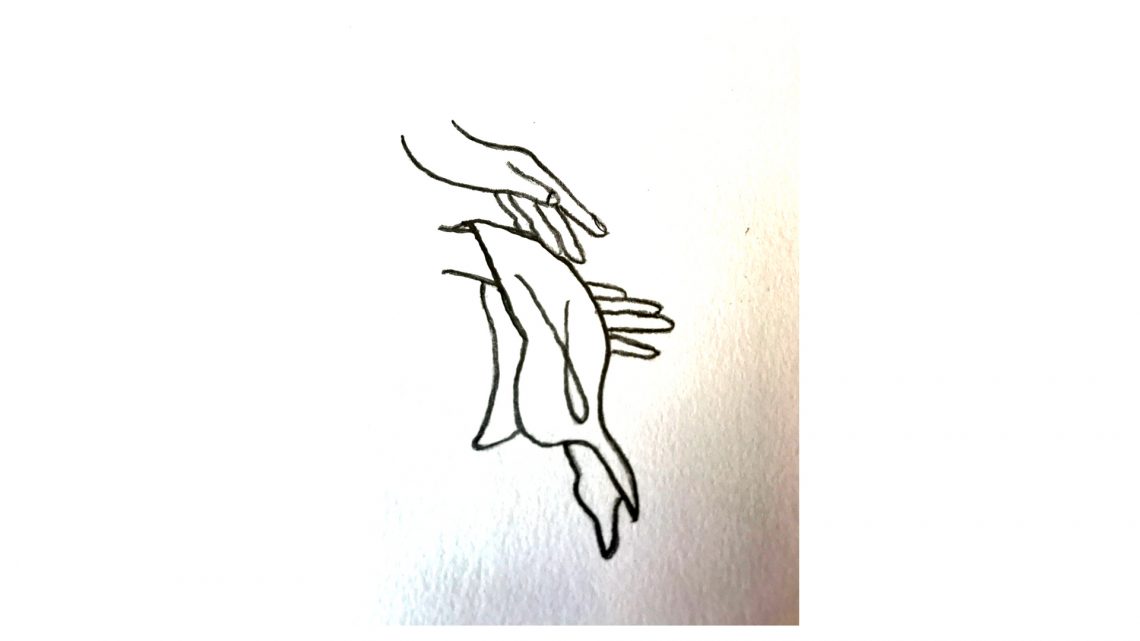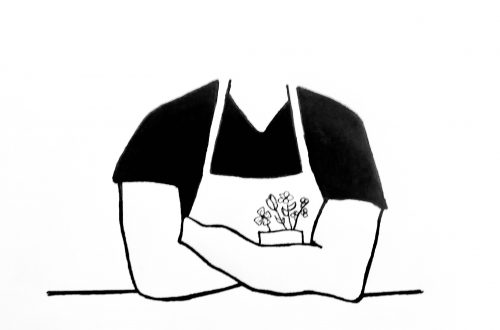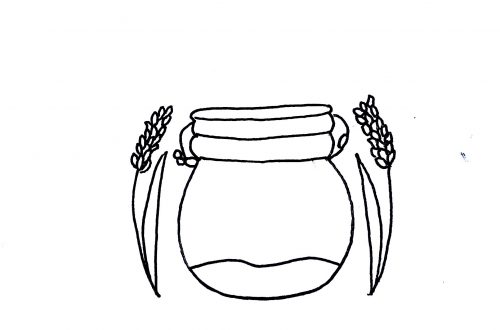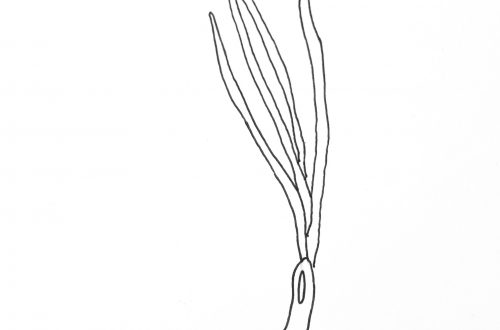by Jessie Shires
Jessie’s essay, “Roots,” appears in The Dirty Spoon Radio Hour, episode 1, which aired May 18, 2018.
Mid-October. In a quiet corner of the Blue Ridge, where cell coverage can’t reach and afternoons thrum with the insistent rhythms of Ruffed Grouse and cicadas, my mother’s garden furiously produces ahead of winter. The first frost arrives during my visit, and mom records it on her calendar, as gardeners do. I will return to Asheville with my car’s trunk packed: a big bag of potatoes with the rich dirt still on, jewel-toned chard far too big for my crisper drawers, herbs by the bunch, squash for miles—butternut, delicata, red kuri stacked like cordwood, and the last of the zucchini and yellow crooknecks offering their final tastes of summer. A rainbow of canned goods nestle alongside, salsas and jams and pickles labeled in my mother’s precise hand.
Many miles later, I evict my cast iron from its cabinet to make way for the winter squashes’ layover, and the more delicate harvest falls under my knife, going in orderly ranks into soup and skillet. It’s a solid, visceral connection to a trip home that’s already melding into the long, warm span of fine family memories. I’m playing old cassette tapes and singing along in the wrong key. I clean as I go, and after I rinse and wring the dishrag, I use it to wipe the water from my hands before hanging it in its place.
My most potent food memories are like this: rememberings of process, not plated dishes; of harvest and its transformation under capable hands.
That simple action—cradling and caressing first one hand and then the other with the damp cloth—it’s a throwaway gesture that no one else would likely even notice, and it’s also the one thing that most vividly and immediately conjures my mother’s presence in my kitchen. I’ve seen her do it thousands of times, and that slight, specific movement roots this chore in the deep, comforting loam of a childhood spent largely in kitchen and garden. My most potent food memories are like this: rememberings of process, not plated dishes; of harvest and its transformation under capable hands. To wit:
Decades ago, late summer meant shifts turning the crank on the old Squeezo strainer, generating a ruby cascade of tomato pulp destined for the pressure canner. The excitement of the job wore off long before the last of the Romas went into the hopper, but that smell—acid, earth, and sweet—has never grown old. My mother ran the edge of a wooden spoon along the machine’s fine mesh screen, scraping dregs of crushed tomato into a neat scarlet stream. We children cranked and cranked and cranked while she swapped full bowls for empty.
These days, I chop onions against a cutting board, with a freshly honed knife edge and a chef’s technique I learned from a YouTube video. My mother always cut onions directly into the pot, holding a crescent-moon section in her left hand, passing the blade in increments through the pearly flesh with her right, its edge stopping each time against the pad of her thumb. Like that dishrag caress, taking up a small knife to cut my own half-moons over a cookpot smudges lines of time and geography, slipping the contours of another kitchen deftly over mine. It’s time travel without the circuit boards, more reliable than a Delorean, set off by the most subtle moments.
It’s time travel without the circuit boards, more reliable than a Delorean, set off by the most subtle moments.
Her kitchen and mine are rife with such prompts: Look inside the bag of self-rising flour in my mother’s pantry, and you’ll find a relic: a tin can, printed with an old applesauce brand, its rosy-cheeked fruit only a little faded. This same can has incised biscuit dough into ranks of perfect circles for close to four decades, and is as essential to the recipe as any other ingredient. The first time I made biscuits in my own kitchen, then 1600 miles and two time zones away from hers, I rolled out the dough and felt utterly lost for want of that very particular implement. I used the rim of a glass, and transferred the soft circles to a sheet pan with careful, floured hands. I knew by the way the dough felt under my fingers that they were right, but without that can they were still never quite the same.
Other cooks in my life have had their idiosyncrasies, but it’s only my mother’s habits I feel overlaid onto mine as I move through the steps of meal prep. The glow around my early memories of home is centered on meals, to be sure; holiday dishes and routine fare both equally fond. But it’s the doing of it all, and the tools of that doing, that grounds me. Recreating something as specific as one meal is impossible—the particular people, the mood of the day simply can’t be replicated. But the summoning of a more general memory, of the care and warmth of those long-ago kitchen sessions, comes easily.
We’re never working alone in our own kitchen. There will always be relics, heirloom knives or hand-me-down pots, and ghosts, in our technique, whether or not we clean as we go, even our choice of singalong music. Every successive kitchen, in house or apartment, has shaped the way I work—the oven that’s always 25 degrees off, these spaces too cramped to roll out a pie crust, those cabinets too small to keep the largest saucepan close at hand. Like all renters, I don’t get to set all the rules in my kitchen. I do what I can with what I’ve got, and learn new ways to adapt to each cranky stove, every confounding layout, all those laughably small counters. But underneath them all is the one thing I can conjure, like a wizard’s spell, with just a simple motion of my hand: the comfort of those earliest family meals, everything that makes this room home.
Jessie Shires grew up in Craig County Virginia where she lived with her mother in a two room farmhouse with no plumbing and no heat. Weaving her way from Kentucky, to New Mexico, and finally to Asheville, Jessie worked as a paramedic for 7 years spending the last few years of that time doing critical care transport for Mission Hospital. When the helicopter couldn’t get to the person, she was the first responder that found a way. Having left the EMS world behind due to what she calls the “laughably low pay” in North Carolina, she found her way back into the service industry, where she currently bartends at Sovereign Remedies.
Artwork by Corinne Pease.






